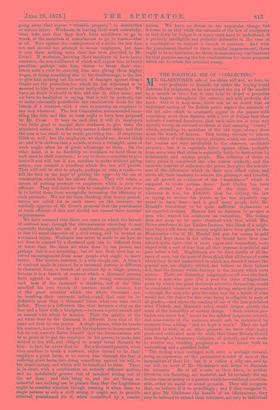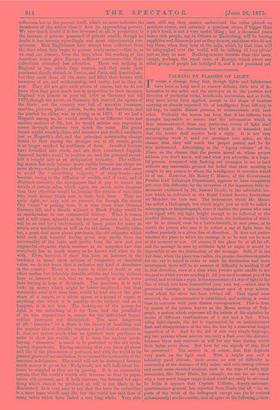THE POLITICAL SIN OF " COLLECTING."
MR. GLADSTONE'S sale of his china will not, we fear, be very profitable to himself, for either the buying world distrusts his judgment, or he has missed the top of the market by a month or two ; but it may help to dispel a prejudice which lingers throughout the country, and will probably die hard. Odd as it may seem, there can be no doubt that an important section of the British public regard the accounts of the art sales which so constantly appear in the papers with something more than distaste, with a sort of feeling that they indicate a national decadence, that such sales are iu some way morally wrong, an outward evidence of that amazing " luxury " which, according to moralists of the old type, always drew down the wrath of heaven. This feeling extends to almost every object of collection except pictures, which are considered, for reasons not very intelligible to the observer, creditable property ; but it is especially bitter against china, probably from some idea that china is especially liable to destruction by housemaids and careless people. The collector of china at fancy prices is considered one who wastes wickedly, and the immense number of collectors, the prices they give, the minute- ness of the differences which in their eyes affect value, and above all, their tendency to admire the grotesque and fanciful, are all quoted as evidences of the "wantonness" which is supposed to make nations decay. Lord Dudley has been more abused for his purchase of the china ship, or whatever it was, for £10,000, than for defying the law in trying to recover his jewels, as he was popularly sup- posed to have done ; and a good many people held Mr. Mendel's bric-a-brac to be quite sufficient explanation of his reported reverses. Heaven had no business to prosper a man who wasted his substance on curiosities. The feeling does not seem to be quite identical with that which Mrs. Stowe attributes to her Yankee farmers, who think if a neigh- bour buys a silk dress, the money might have been given to the Missionaries—for if Mr. Mendel had put his money in gold bars and kept them in his cellar, he would have been con- sidered quite right—but is more vague and despondent, more tinged with a sort of fear that all that expense is prideful and goes before a fall. Englishmen are the least thrifty of all the races of men, but the mass of them think that all forms of waste which they do not understand, or which are flaunted before the general eye, are slightly wicked, and believe as their fathers did, that the luxury which destroys is the luxury which costs money. There are dissenting congregations all over the land, where a man who gave 25s. a pear for those d'Angouleme pears by which the great fruiterers advertise themselves, would be considered, whatever his wealth, a fitting subject for prayer, —though the man who gave the same sum for a bottle of wine would not, the desire for fine wine being intelligible to men of all grades,—and where the reading of one of the lists published after Christie and Manson's sales, would deepen greatly the sense of the instability of earthly things. "Such wanton pro- fusion can never last," would be the mildest judgment uttered, and nine-tenths of the audience would only be restrained by manners from adding, "and we hope it won't." They are half tempted to wish, as on other grounds we know that many pious and cultivated men do wish, that Great Britain should pass through a temporary visitation of poverty, and are ready to receive any croaking prophecy as to her future with an undoubting and a gratified belief.
The feeling when untinged with envy is perhaps .natural, being an expression of the permanent wonder of men at the inequalities of their lot ; but it is rather a silly one, and no one will be sorry if Mr. Gladstone's sale helps to diminish its intensity. He at all events, as they know, is neither frivolous, nor flaunting, nor wasteful, and he certainly did not devote time or money to a pursuit which he considered question- able, either on moral or social grounds. They will recognise that, we believe, if it be unwillingly ; and if they recognise it, and give Mr. Gladstone the benefit of an idiosyncrasy, they may be induced to extend their tolerance, not only to individual collectors, but to the pursuit itself, which no more indicates the decadence of the nation than it does its approaching poverty. We very much doubt if it has increased at all, in proportion to the increase of persons possessed of private wealth, though no doubt it has become exceedingly and most objectionably con- spicuous. Rich Englishmen have always been collectors from the days when they began to possess ready-money—that is, as we read our history, from the days when the working of the American mines gave Europe sufficient currency—but their collections attracted less attention. There was nothing in England to buy which they wanted, and they made their purchases chiefly abroad, in Venice, and Paris, and Amsterdam ; but they made them all the same, and filled their houses with treasures of art, and workmanship, and rarity, just as they do now. They did not give such prices, of course, but we do not know that they gave much less in proportion to their incomes. England was almost as poor till 1800 as Germany was till 1870, though she never, as Germany did, starved the agents of the State ; yet the country was full of movable treasures, marbles, pictures, plate, jewels, books, and fine furniture, and the passion for china was as strong as in 1875. If we had a Hogarth among us, he would ascribe to us different vices and another method of life, but he would satirise our expensive- nesses through allusions very much the same. His grand dames would worship china and monsters and stuffed monkeys, just as Hogarth's did, and the principal noteworthy change would be that among the stronger sex at all events, grade is no longer marked by costliness of dress. Jewelled buttons have dwindled into studs, and are then considered foppish, diamond buckles would be trodden on, and the gemmed sword- hilt is bought only as an antiquarian curiosity. The collect- ing mania has only become more visible because our shops are more showy--though the richest sellers affect more and more to avoid the "advertising vulgarity " of shop-fronts—and because, owing to the diffusion of wealth, and of taste, and of dilettante curiosity, the newspapers find it pay to record the details of certain sales, which again are much more frequent than they otherwise would be, because the owners of curiosities who want money think now is their best time. They are quite right, we may add en passant, for though the recent city "scare" is passing over, it is nine years since Overend Gurneys fell, and a decade without a Black Friday would be an anachronism in our commercial history. When it comes, and it will come, splendid as the harvest promises to be, there will be an end for a twelvemonth of fancy prices for many an article now marketable as well as for old china. Society talks, too, a great deal more about purchases, the old etiquette which held such talk boastful having given way, partly from the universality of the taste, and partly from the new and not ungraceful etiquette which assumes as an unspoken fact that everybody has as much money as he knows well what to do with. Even, however, if there has been an increase in the tendency to spend upon articles of temporary or doubtful value, we do not know that it indicates any kind of decadence in the country. There is no harm in china of itself, or any other useless but tolerably durable article, and buying without hope of interest is not, that we see, morally so much worse than buying in hope of dividends. The purchase, it is said, locks up money which might be better employed ; but that statement, even if it were trae, would be true also of the pur- chase of a carpet, or a silver spoon, or a pound of sugar, or anything else which it is possible to do without, and as it happens, it is not true. The locking-up of the money for John is the unlocking of it for Tom, and the possibility of its wise expenditure is, except for the individual buyer, neither increased nor diminished. The most dangerous of all " luxuries " to a State is the luxury of hoarding, and the popular idea of frivolity requires a good deal of correction. It does not matter much what an ignorant man purchases in order to show his wealth ; or if it does, the modern mode, buying "treasures," is much to be preferred to the old mode, buying dependents. Buying anything that you know all about and like is the pleasantest of pastimes, and with the world in its present groove of accumulation, by no means the most costly of the innocent indulgences. The world will not be destroyed because much money is given for 'Wedgwood,' nor will individual for- tunes be crippled as they are by gaming. It is as reasonably certain that the world's wealth will increase as that its popu- lation will increase, and if both increase, the demand for any- thing which cannot be produced at will is not likely to be diminished. It is very easy to say that the taste for curiosities is a mere taste which may die, but the world has said that of many tastes which have lasted a very long while. Very able men still say they cannot understand the value placed on precious stones, and certainly a precious stone, if bigger than a pin's head, is not a very useful thing ; but a thousand years hence rich people, say in Ottawa or Maritzburg, will be buying sapphires and diamonds just as they do now, and those who do not buy them, when they hear of the sales, which by that time will be telegraphed over the world, will be talking of luxe efre'ne just as they do now. Nothing is more durable than this taste, except, perhaps, the royal caste of Europe, which above any other group of people has indulged it, and is not punished yet.



































 Previous page
Previous page